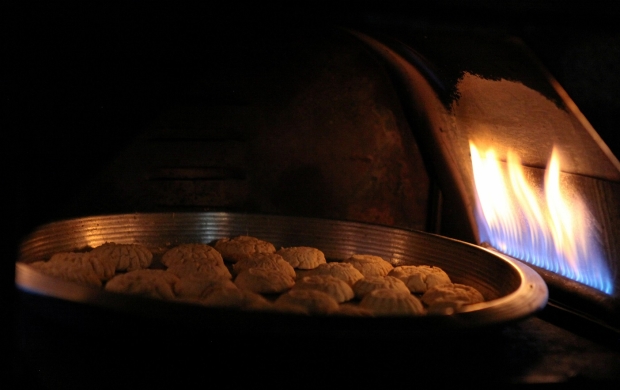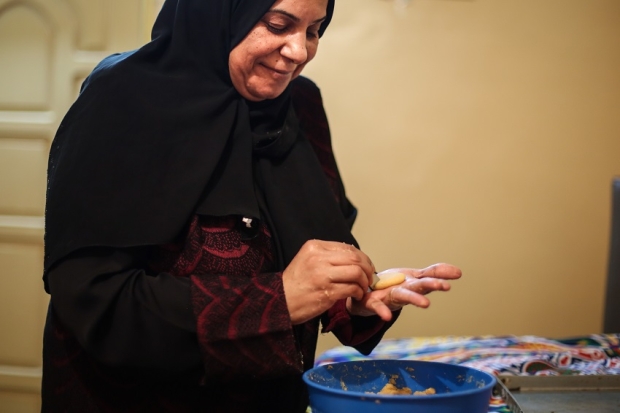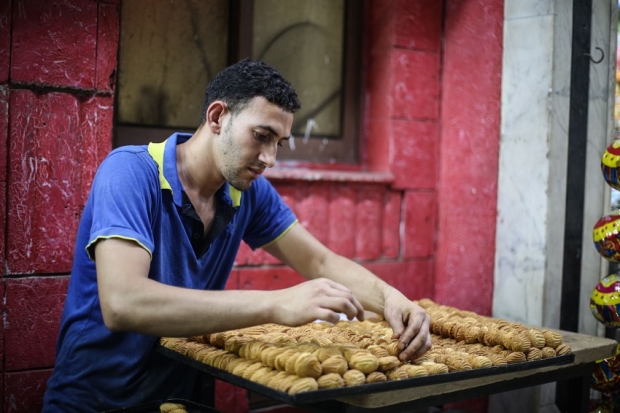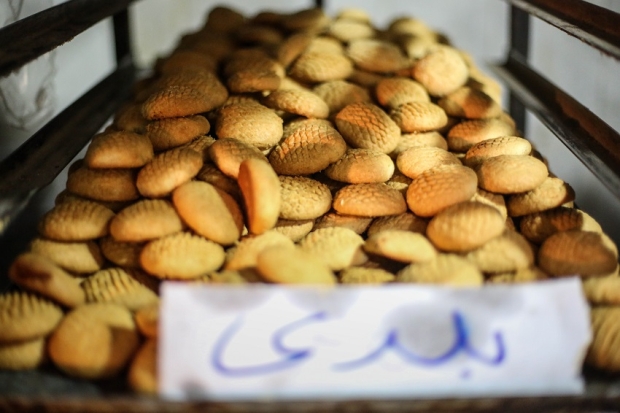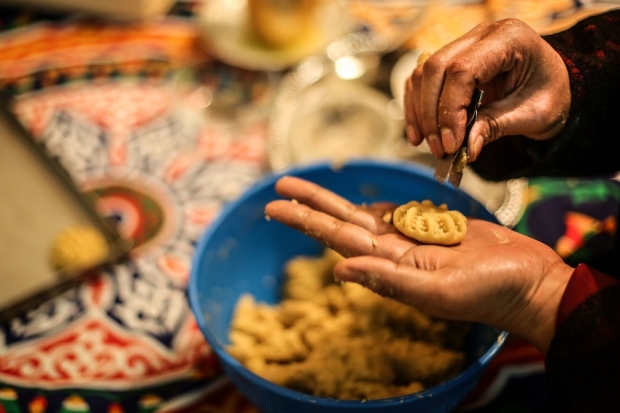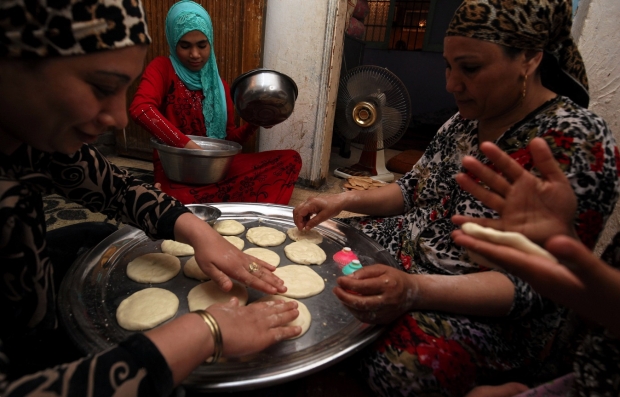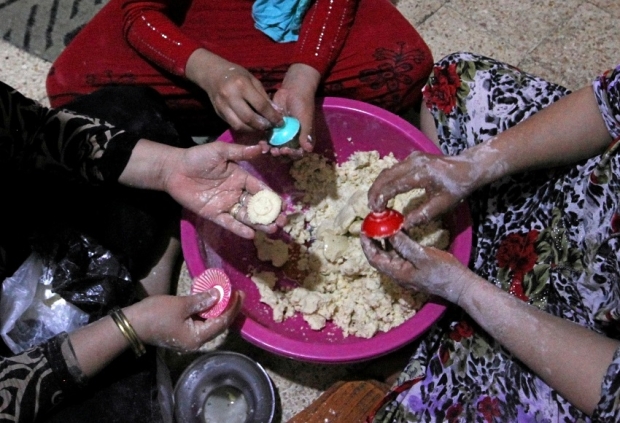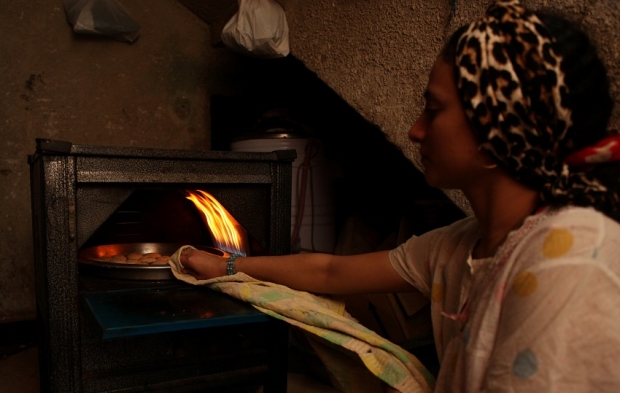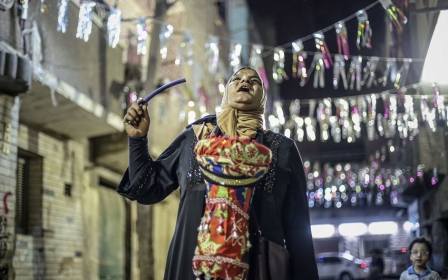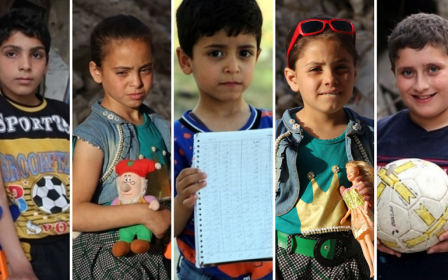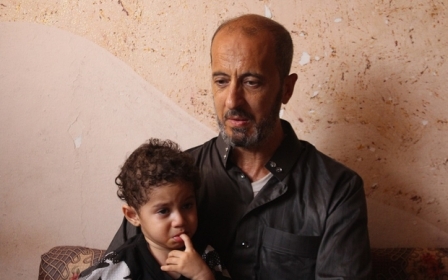Baking Eid cookies in the age of austerity: 'I'm keeping this tradition alive'
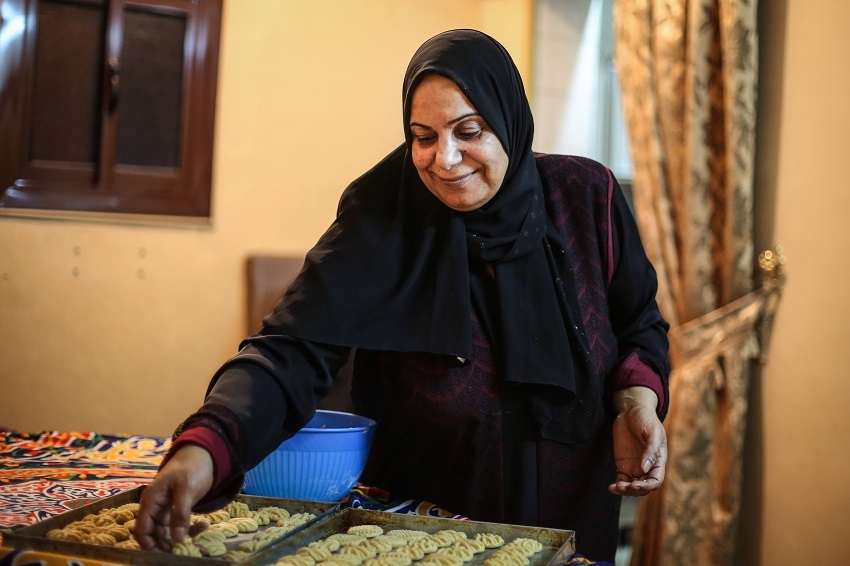
GIZA, Egypt - Um Karima is carefully balancing four trays of cookies on her head as she walks into a small bakery on a busy street in Giza, located just a few steps away from her home.
Arranged on the tray is round-shaped kahk, traditional Egyptian butter cookies that are a staple in Eid celebrations, also known as Eid el-Fitr, which mark the end of the holy month of Ramadan, when Muslims fast from dawn to dusk.
One by one, a bakery employee takes the trays of cookies and places them in the oven.
“Don’t eat any of it,” Um Karima joked with the bakery’s employees as she left. “I can’t promise I won’t,” one of them responded.
They agreed she would be back early the next morning to pick up her kahk.
Many Egyptians even call the holidays marking the end of Ramadan Eid el-Kahk. The kahk dough can be stuffed with dates, walnuts, pistachios, malban (similar to Turkish delight), agameya (a mix of honey and nuts), or even served plain, depending on each family’s palate.
When I was a child my mother would sit me and my sisters down and we would help her make the kahk, and carefully shape it and place it on the tray before heating it up in the mud oven we had back then
- Um Karima
“We used to bake it in the oven at home,” the 34-year-old mother of five told Middle East Eye, “but it’s too expensive to do that now. The gas cylinder costs EGP 60 ($3.50).”
Instead of baking hers at home, Um Karima solicits the help of the local bakery, which bakes them at EGP 10 ($0.60) per tray. Last year, the same bakery charged EGP 8 ($0.50) for the same tray of kahk.
Um Karima had stopped baking kahk at home since the government floated its currency in 2016, causing a hike in prices, which took a toll on every part of society. Local traditions and customs were no exception.
“That is how it has always been. When I was a child my mother would sit me and my sisters down and we would help her make the kahk, and carefully shape it and place it on the tray before heating it up in the mud oven we had back then.
“Last year we baked ten kilos [of kahk], but this year we could only make five kilos,” she lamented.
Austerity bites
Egyptians continue to struggle to get by as they grapple with another round of austerity measures, despite a drop in inflation to 11.5 percent in May from 12.9 percent in April, according to Egypt's national statistics agency.
This week, the government announced a cut in electricity subsidies by 26 percent starting in July. Earlier this month, the price of drinking water and sanitation services was also increased by 46 percent. Last month, the government raised metro ticket prices, more than tripling some fares, sparking angry and sporadic protests. These measures come as part of a $12bn International Monetary Fund loan programme.
Ramadan, an employee at the bakery named after the holy month, told Middle East Eye that this year they have been selling a kilo of kahk stuffed with dates and malban for EGP 160 ($9).
The prices have affected everyone and everything
- Manar, bakery customer
“I don’t know how to bake it myself,” Manar told MEE. “I don’t know anyone who makes it at home at all any more. Most people think it’s too much work and not worth the slight difference in cost.”
An employee in the shop, displaying trendy Ramadan desserts such as kunafa made with a modern twist including mango, Nutella, and red velvet cake stuffings, confirmed to MEE that prices have risen this year, but could not elaborate on how much.
Sweet spot
Randa Maher, a 27-year-old mother of two, sat outside her modest home in 6th of October city in Giza, cradling her nine-month old son and watching her five-year-old daughter run around.
“Yes, it’s cheaper to make it at home, but for many people the meagre difference in price is not worth the effort and the time,” Maher told MEE. “There are so many people I know that have stopped baking it at home, especially the younger generations.”
Baking kakh is a tradition and I can't do without. I want my children to experience the same happiness that I experienced as a child
- Randa Maher, mother of two
Yet for Maher, skipping this Eid tradition is out of the question.
“I remember seeing my mother bake kahk every year a week before Eid,” Maher told MEE. “She would squish and mush up the dough, and my brother and I would mould it and shape it.
“I would watch her put the yeast on the flour and then add butter to the mix. She would add a hint of vanilla essence, milk mixed with sugar, a dash of rose water, orange, or banana essence, or anything really, to make the kahk smell nice,” Maher said.
The best part of the whole process, she says with a smile, was the “happiness that came along with it”.
The high prices have led her family to also decrease the quantities of the baked goods. “A few years ago we would make around 12 kilos, this year we made just four.”
Butter and ghee
The rising prices of each of the ingredients have affected the production of kahk in different homes, but ghee and butter have seen the most dramatic price hikes.
“One kilo of ghee now could cost EGP 90 ($5), or even more. It cost EGP 35 ($2) before the inflation and EGP 16 (less than $1) a few years before that,” Um Karima told Middle East Eye.
Maher said she bought a lower quality brand of butter because it is cheaper, as opposed to an imported brand she usually buys that cost her over EGP 140 ($8). She spent EGP 37 ($2) on ghee for each kilo of kahk.
“Some brands are so bad though, it makes you feel like you’re not even eating real kahk,” Maher explained.
Eid customs
Fifty-two-year-old Nadia Ahmed sits in her apartment with bowls of dough in front of her, going through the steps of adding and mixing the kahk ingredients together as though she could be doing it with her eyes closed.
“[Baking kahk] is a tradition and I cannot do without. Even for my children, I want them to experience the same happiness that I experienced as a child. This is something we are used to doing at home, and without it, it would feel like something is missing,” Maher told MEE.
Ahmed has three daughters and one son, and she says the entire family gets together to bake.
It’s not just any other day, it has its own joy
- Nadia Ahmed
“It’s not just any other day, it has its own joy.” After they finish putting everything together, they carry all of the trays to the bakery at the end of the street where it costs 10 EGP ($0.60) per tray to put in the oven.
“[The prices] have affected everyone and everything,” Manar said.
But Egyptian women insist on maintaining Eid customs and traditions.
“It is mostly about getting together and making something collectively,” Maher, who left her hometown of Fayoum, southwest of Cairo, two years ago to come and live in Giza, said. This year, her older brother and his wife came to spend the day baking with her.
“Back in Fayoum, all of our relatives and neighbours would get together to make the kahk. We would take turns and help each family bake each day of the week,” she recalled with a sense of nostalgia.
Ahmed also said that the process of baking kahk feels like an act full of “blessings” for her. “For example, if one of our neighbours is tired or sick this year, we all make sure to bake a batch of kahk for her. That’s what the whole tradition is about.” In fact, generously gifting kahk to guests is a common practice.
“I am happy that I am keeping [this tradition] alive for my children,” Ahmed said.
This article is available in French on Middle East Eye French edition.
Stay informed with MEE's newsletters
Sign up to get the latest alerts, insights and analysis, starting with Turkey Unpacked
Middle East Eye delivers independent and unrivalled coverage and analysis of the Middle East, North Africa and beyond. To learn more about republishing this content and the associated fees, please fill out this form. More about MEE can be found here.


